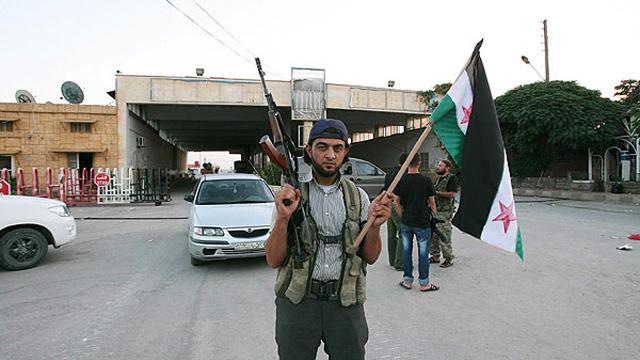
Photo: Adem Altan. A Free Syrian Army soldier holds a rifle and a Syrian flag at the Bab al-Salam border crossing to Turkey on July 22, 2012.
Syrian exiles in Berlin announced Tuesday that they've been holding secret meetings over the past six months with rebel leaders from their war-torn country, and presented a written plan for a post-Assad interim government that emphasizes equality of all citizens, the protection of human rights and a revitalized economy focusing on social justice and development.
The framework document, known as “The Day After,” was crafted with assistance from the D.C.-based United States Institute of Peace and the German Institute for International and Security Affairs – although the exiles who participated in drawing up the plan stressed that Syrians themselves would be responsible for crafting the democratic goals for the country after the fall of Bashar al-Assad.
“We wanted people on the inside who were directly involved in activism, in actually dealing with day-to-day issues facing them, and we also wanted technical experts who understood what it was like to deal with a transition period,” said Amr al-Azm, a history professor at Ohio’s Shawnee State University, who was on the executive committee that released the document.
Presenting at a highly attended press conference in Berlin, the Syrian exiles sought to demonstrate to Western countries disengaged from the bloody conflict that there is an increasingly organized and unified opposition preparing to assume democratic leadership when the moment of transition arrives.
The democratic values articulated in “The Day After” aim to help Syrians by “empowering them to take their destinies back into their hands, back from the rule of arms and terror, into the rule of law where every Syrian citizen counts and where the human rights of every citizen matters,” said Afra Jalabi, a political scientist based in Montreal and member of the Istanbul-based Syrian National Council, which represents a majority Sunni population and contributed to the executive committee’s work on the document.
“This project is a response to the incredible level of commitment and sacrifice by the Syrian people to transition their society back into a civil society that respects human rights, democracy and the principles that have been established in modern times,” she added.
The individuals presenting the paper reiterated what Syrians have been requesting for months from Western powers in the way of vital air support and armaments for rebel fighters to defend against jet, helicopter and heavy artillery attacks. “If that means providing us with the necessary tools to do so, including lethal aid, then that is acceptable,” said al-Azm, and “if it means military intervention in terms of no fly zones and buffer zones in the areas that have currently been liberated, and these are quite significant, then so be it.”
However, members of the executive committee expressly said they did not want military intervention from Western governments in the form of “boots on the ground.”
While the document includes broad plans for rebuilding a democratic and peaceful society in Syria after the 18-month uprising that has led to more than 17,000 deaths, it does not ensure that a transitional government is in fact yet ready to take over once the regime falls.
But according to the executive committee, every Syrian political group both inside and outside of Syria, as well as the Free Syrian Army, had been consulted prior to the release of the document.
The committee said that although the FSA has been accused of rivaling Assad’s brutality with its own brand of dirty war – including torturing and executing prisoners captured from the loyalist Syrian Army – the FSA should form the basis of the post-Assad Syrian military. The committee, if handed power, promised to vet FSA fighters before enabling them to continue serving, and to try those who committed war crimes.
“The challenge that the Syrians are facing is that we are trying to respond in political ways to a military and security campaign,” said Jalabi. “We are trying to campaign for human rights and the cessation of the violence that the Syrian regime is committing.
“That is the difficulty, and why the Syrian opposition outside Syria has not been able to help spare the lives of Syrians,” she added.
3 WAYS TO SHOW YOUR SUPPORT
- Log in to post comments











